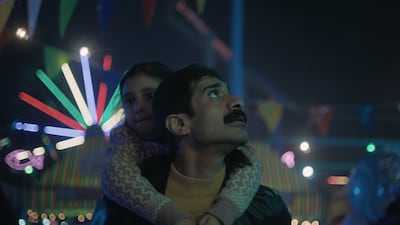It’s been just over four years since Saudi Arabia opened to wide-scale tourism, and the world has barely begun to get to know Riyadh.
For its local population, they, too, are getting re-acclimated, as the capital city that they call home is transforming before their eyes faster than it ever has before. It’s not just the massive infrastructure projects, the influx of new residents, nor the now-bustling cultural scene. There are changes deep into the very fabric of the city, ones that will never show up in a promotional video.
Mandoob, the feature debut of Saudi filmmaker Ali Kalthami, was inspired by those changes. Kalthami is co-founder of the influential Saudi production company Telfaz11, which spent 10 years building a legion of rabid fans thanks to their wildly popular YouTube web series and has now turned it into a box office and streaming powerhouse.
Kalthami was always a bit of an outsider, a kid from a lower class than many of his friends who was thus able to observe social machinations from a different perspective. When he felt certain aspects of the life he had built disappear, he knew it was time to document that transformation in his first film, before it was all gone forever.

The film’s protagonist, Fahad, is an outsider, too, though he is far less adept at adapting than Kalthami himself. When we meet him, he’s working at a call centre, struggling to keep it together. His father is sick and relies on Fahad to pay his medical bills. When a sudden outburst causes him to lose his job, he becomes a night courier to make ends meet. But that is not enough, so he steals illegal goods from local bootleggers and attempts to resell them on his delivery routes, much to the ire of a local crime syndicate.
As he traverses the city, struggling to find customers that will buy his contraband before he’s caught, he realises that he doesn’t know the city as well as he thought he did. There are underground clubs, private parties and glamorous lives all hidden behind unassuming closed doors he had never thought to open. This is not the Riyadh you have seen in advertisements. It is Riyadh as it is truly lived, in all its inequality – a world Fahad is not equipped to handle. Fahad is going to have to change, too, or die trying.
It is a compelling narrative on its own, but the reason it soars is twofold. First is the performance from Telfaz11 regular Mohammed Dokhei. The character could have strayed towards one dimensional if he had not added some fascinating layers throughout. In one standout scene, Fahad is confronted by a former colleague about his new life and lies about how well he is doing. Dokhei plays it with an unnerving energy that single-handedly makes it one of the most memorable sequences in the film.
Kalthami’s directing, meanwhile, is marked by the maturity of a filmmaker who has been crafting stories for years. Yes, the film is highly stylised, with mood lighting and eye-catching night-time cinematography that evokes filmmakers such as Nicholas Winding Refn and Martin Scorsese. Unlike comparable movies, however, the style is always in service of the film’s substance. The way the film is shot communicates the character’s mood. It never feels like a filmmaker who is just flexing his skills. This is the work of a person with something to say.

Mandoob is the second major film from Telfaz11 to hit cinemas in 2023, and much like their wrestling comedy Sattar at the beginning of the year, this too has become an instant success with audiences, bringing in hundreds of thousands who are eager to experience something completely new from a creator who has earned their trust.
While Sattar, on the other hand, may contain a repeatable formula that his partners will be able to use moving forward, it is hard to say where Mandoob leads us, or where Kalthami will head next. With a film as striking as this though, both deeply personal and socially minded, there will surely be an even bigger legion of fans both old and new eager to follow him wherever that may be. I am now among them.


